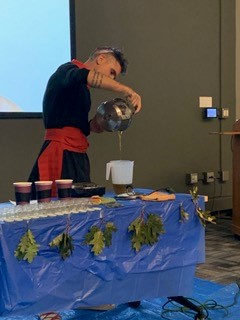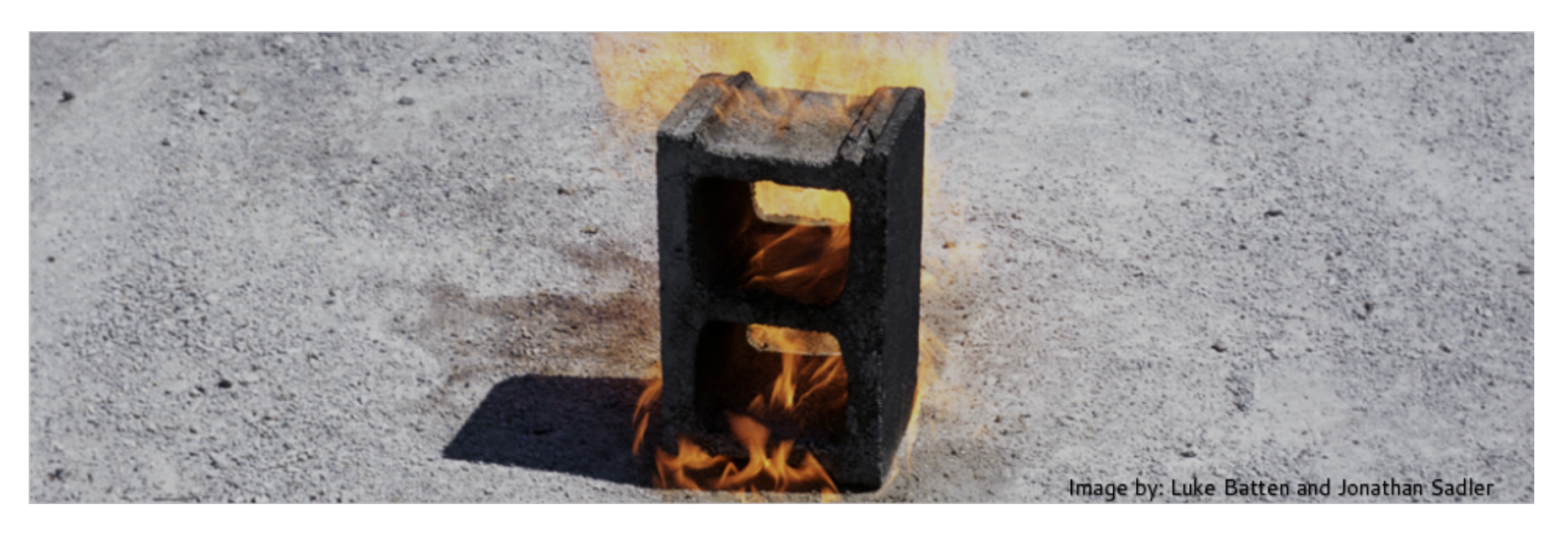
Ethan Madarieta, newly minted Ph.D. in HGMS and Comparative and World Literature, performed his second memory performance piece at the Levis Center on 23 September, 2019. The multimedia performance contained video, music, spoken word, and cooking and evoked memories of “grandma’s medicine,” a mysterious but alimentary substance which we audience members were offered as gifts at the close of the remarkable evening. ~ Brett Ashley Kaplan
"Iraganeko Zuloa | Grandma's Medicine"
In euskara (the Basque language) zuloa means "hole" but also signifies "cave" - a locus of sustained connection to pre-Colonial Basque culture and history. It also signifies the "holes" where Basque separatists (ETA) detained state hostages for the sake of territorial negotiations. "Iraganeko Zuloa" is a memorial palimpsest from the cave of the past that sustains ways of indigenous knowing and doing through memory. It is a performance of memory that draws together the story of my great grandmother's salve that my family calls amumaren medikunza (grandma's medicine).
In Basque mythology it is said "the bees know when the master dies." The bees live at the interstice of our world and the next, offering passage to the afterlife. The "master" refers to the master of the farmhouse, or baserri. "Master" also refers to Basque involvement in the colonization of the Americas. In "Iraganeko Zuloa" I make a play on the death of the master by inserting myself in three positions of "mastery": the baserri jauna (master of the farm), the colonizer, and myself in the present.
The performance is in two parts: the video with music and incantations overdubbed, and the final performance where the video is projected over me while I make "grandma's medicine," tell stories of my childhood involving the medicine, and then jar the medicine to be handed out to each member of the audience.
The video: Through 38 minutes I am submerged in five gallons of honey, poured from an invisible source above, which slowly begins to suffocate me as it fills my nose and mouth. A txalaparta (Basque percussive instrument) improvisation plays throughout, becoming more and more complex and frenetic. Two repeated "prayers" break through the percussion and tell the story of my family entwined with Basque mythology as recovered by Jose Miguel Barandiaran Aierbe.
The live performance: For 38 minutes the video and audio play while I make grandma's medicine on a prepared table with: hotplate, oak leaves (Gernikako areola - symbol of the origins of Basque democracy), small medicine jars, a pitcher, a towel, and three cups full of pine resin, olive oil, and bees wax respectively. I am dressed in oinkari (Basque dancers) regalia I inherited from my father. Between each pre-recorded incantation I tell an improvised story about my childhood experiences with grandma's medicine, its origins, and issues of ethnicity, whiteness, and memory. The end of the performance is marked by the five gallons of honey having been completely emptied over my body, entering my nose and exiting my mouth, eyes covered in honey and half-closed, hair matted against my forehead. The music becomes chaotic and distinct notes are indeterminable. I pour the medicine from the pot to the pitcher and fill each jar with the liquid. It immediately begins to become solid and by the time I am done filling all the jars I am able to distribute a jar of medicine to each audience member, whispering to them, "the memory is the medicine" and "the medicine is the memory."
"Iraganeko Zuloa" is a ritual to kill the colonizer in my genealogy and in myself. It is a ritual to sever the historical trajectory of colonial violence through my own memorial path symbolized and embodied through the making of medicine and storytelling. Recognizing that my colonial inheritance will always mark me becomes the realization of the necessity for ongoing practices of critique that lay bare my inheritance of the logics of empire.
~ Ethan Madarieta, Ph.D.

